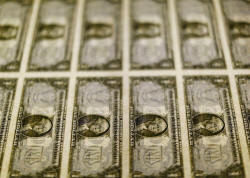|
The
Japanese currency had its strongest start to a year since 2008
in the first quarter <JPY=> as shaky global markets boosted
demand for the traditional safe-haven currency. It has gained
some 12 percent against the dollar since late January.
Those gains prompted Japanese officials to warn on Monday that
the yen moves were "one-sided and speculative" and that the
government stood ready to intervene to weaken the currency.
But with oil prices holding well above $40 per barrel on Tuesday
and risk appetite on the rise, the yen needed no such
intervention to drive it lower. It slipped quarter of a percent
to 108.20 per dollar. [O/R]
Against most other currencies, though, the dollar was on the
defensive, in particular those that move in sync with oil
prices. It hit an almost-six-month low against the Norwegian
crown <NOK=> and also fell towards a six-month low against the
Canadian dollar. <CAD=D4>
"Oil prices holding above $40 a barrel overnight has got the
dollar on the back foot, more than anything else, so we have the
yen and the dollar at the bottom, and everything else at the
top," said Kit Juckes, macro strategist at Societe Generale in
London.
"I think dollar/yen will get back to 120 at some point – we
might want to sell it again there, but I think this move is way
overdone," he added.
The dollar index <.DXY>, which measures the greenback against a
basket of six major currencies, edged down 0.1 percent, towards
a 7-1/2-month low of 93.748 hit on Monday. The index has shed
nearly 3 percent since Federal Reserve Chair Janet Yellen threw
doubt on expectations that U.S. interest rates would be
increased twice this year.
Fed funds futures <0#FF:> imply barely one quarter point
increase for the whole of 2016, with only about a 20 percent
chance of a hike in June priced in.
"Since the previous Group of 20 meeting in February, there's a
perception that there's a political agreement between the United
States and China that a strong dollar is not desirable," said a
trader at a U.S. bank in Tokyo.
"In light of this, monetary easing in Europe and Japan has
limited power," he said.
The euro, which touched a six-month high of $1.1454 <EUR=> last
Thursday, was trading close to that peak at $1.1422, up 0.1
percent on the day.
(Additional reporting by Ian Chua in Sydney and Hideyuki Sano in
Tokyo Editing by Jeremy Gaunt)
[© 2016 Thomson Reuters. All rights
reserved.] Copyright 2016 Reuters. All rights reserved. This material may not be published,
broadcast, rewritten or redistributed.
 |
|





